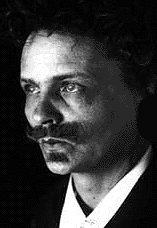Swedish dramatist, painter and novelist, (Johan) August Strindberg was born the third of nine children in Stockholm on 22 January 1849 to Carl Oscar Strindberg and his former maid servant and mistress Ulrika Eleonora Norling.  Strindberg was allegedly a difficult child, overly sensitive, suspicious and irritable, who resented discipline of any kind. His behaviour is said to have worsened after his mother died from tuberculosis in 1862 and his father remarried the following year. In 1867 Strindberg entered Upsala University, but struggled with his studies until he left, without taking a degree, to take work as a tutor, journalist and librarian.
Strindberg was allegedly a difficult child, overly sensitive, suspicious and irritable, who resented discipline of any kind. His behaviour is said to have worsened after his mother died from tuberculosis in 1862 and his father remarried the following year. In 1867 Strindberg entered Upsala University, but struggled with his studies until he left, without taking a degree, to take work as a tutor, journalist and librarian.
The unstable temperament that marked Strindberg's childhood continued throughout his life ranging from neurotic to unstable to clearly disordered, however the stresses he lived under gave him a perspective on the world which enabled him to peel away the carefully arranged exteriors of middle-class life. His writing career began in his early twenties after a suicide attempt following his rejection as an actor at the Royal Dramatic Theatre in Stockholm. His first plays were mostly historical, echoes of Ibsen's work and now mostly forgotten. The novel The Red Room (1879), in which he satirized hypocrisy and injustice in Swedish life, marked Strindberg's literary breakthrough and the beginning of numerous other writings of a literary and autobiographical nature including about fifty plays, countless novels, volumes of essays, short stories, poems, memoirs, as well as scientific and philosophical treatises, in fact his collected works extend to fifty five volumes.
Strindberg began writing a series of bitter realistic dramas that portrayed the basic corruptions of human nature. The first of these was The Father (1887), in which a Captain is driven insane by his wife. Strindberg's preoccupation with the female as a predator and the constant and consuming battle for power between the sexes was an oft repeated theme little understood in his own time but his plays today have taken on a new relevance and directness. His well known play Miss Julie (1888) also comes from this time. This series of plays, which also include The Creditors (1888), The Bond (1892) and Playing with Fire (1893), represent a turning point in modern drama as Strindberg attempted to make a dramatic language out of the terse broken rhythms of speech. For while his dialogue was thought to be natural and real it was in fact carefully composed and orchestrated.
The later plays fell into two groups, firstly there were a series of powerful and original historical dramas, Gustavus Vasa(1899), Erik XIV (1899) and Gustaf Adolf (1900). These were followed by To Damascus (written in three parts between 1898-1901), The Dream Play (1901), where he attempted to replicate the transparently logical form of a dream, and The Ghost Sonata (1907) called a Chamber Play to be performed in the Intimate Theatre. These plays all offered both a profound and genuine mystical experience and made him a master in both naturalism and symbolism and a forerunner of the expressionism of post-war theatre.
Strindberg founded Intima Teatern, or Intimate Theatre Stockholm, in 1907 with August Falck. This theatre was based on his innovations of the form of chamber music. Here the variety and abundance of his technical invention and virtuosity had full scope, and many of the theatrical devices he initiated still influence modern theatre. He influenced such writers as Tennessee Williams, Eugene Ionesco and Harold Pinter.
Strindberg was married three times first to actress Siri von Essen in 1877 with whom he had three children before divorcing in 1891. Then in 1893 he married Austrian journalist Frida Uhl and had a daughter. Finally he married actress Harriet Bosse who birthed another daughter. He died on 14 May 1912 from stomach cancer.